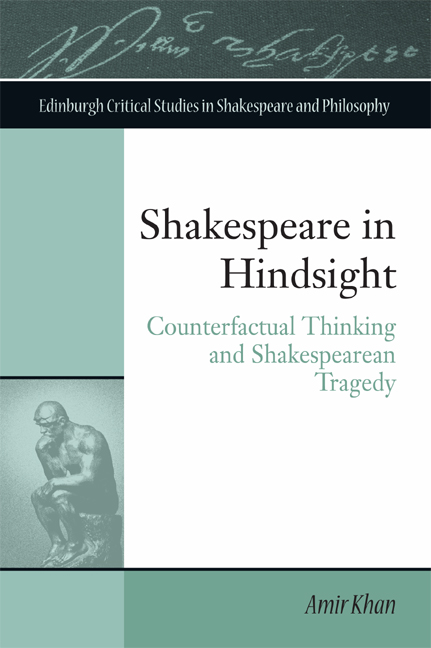Book contents
- Frontmatter
- Contents
- Acknowledgements
- A Note on Texts
- Series Editor's Preface
- Dedication
- 1 Introduction
- 2 My Kingdom for a Ghost: Counterfactual Thinking and Hamlet
- 3 Reversing Good and Evil: Counterfactual Thinking and King Lear
- 4 Staging Passivity: Counterfactual Thinking and Macbeth
- 5 Reversing Time: Counterfactual Thinking and The Winter's Tale
- 6 ‘Why Indeed Did I Marry?’: Counterfactual Thinking and Othello
- 7 Conclusion
- Notes
- Further Reading
- Index
6 - ‘Why Indeed Did I Marry?’: Counterfactual Thinking and Othello
Published online by Cambridge University Press: 05 August 2016
- Frontmatter
- Contents
- Acknowledgements
- A Note on Texts
- Series Editor's Preface
- Dedication
- 1 Introduction
- 2 My Kingdom for a Ghost: Counterfactual Thinking and Hamlet
- 3 Reversing Good and Evil: Counterfactual Thinking and King Lear
- 4 Staging Passivity: Counterfactual Thinking and Macbeth
- 5 Reversing Time: Counterfactual Thinking and The Winter's Tale
- 6 ‘Why Indeed Did I Marry?’: Counterfactual Thinking and Othello
- 7 Conclusion
- Notes
- Further Reading
- Index
Summary
Existing in sacred time within a sacred order has its limits. The dialectical pressure to break free from some overarching ‘essentialism’ is what gives Shakespeare criticism much of its driving impetus today. What are the Edmunds and Iagos, let alone the Hamlets and the Lears, of the world to do finding themselves marginalised in such a setup? If the social order as is is unbearable, the only suitable way forward, it seems, is to commit to suffering in hopes of transcending perceived injustices. Edmund and Iago are hardly thought of as tragic characters. It is hardly tragic that Edmund is a bastard, or that Iago is overlooked for promotion. Yet neither is willing simply to yield to the ‘static’ unfolding of sacred time. Each rejects the status quo, choosing instead to exploit his existence in historical time in hopes of manipulating or transforming the social order to achieve not a transcendence of fate, but a conquest of it. This is the meaning behind Edmund's aside: the ‘excellent foppery’ of the world is one that takes the social order to be necessary, as though human desires are ultimately incapable of transforming it. Iago's advice to Roderigo to ‘make money’ (1.3.348–9) is a plea to take hold of time. Edmund and Iago believe the dialectic of historical time will reveal not the necessity of their suffering, but rather, their possible liberation. We castigate them as villains for thinking this way, but they are no different from Macbeth when he says that ‘time and the hour runs through the roughest day’ (1.4.146), which is an elaborate way of saying that time heals all wounds. This is not a Machiavellian sentiment necessarily, particularly if the idea is simply that what we are made to suffer can be changed. In a dialectical conception of unfolding, the marginalisation and even possible devastation at the hands of an existing finite social order are not something to be yielded to in the present, but something to be overcome, resulting not in the renewal of social bonds but in their future transmutation.
- Type
- Chapter
- Information
- Shakespeare in HindsightCounterfactual Thinking and Shakespearean Tragedy, pp. 121 - 138Publisher: Edinburgh University PressPrint publication year: 2015



